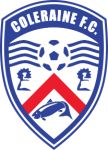Coleraine Football Club is a semi-professional Northern Irish football club, playing in the NIFL Premiership. The club, founded in 1927, hails from Coleraine, County Londonderry and plays its home matches at The Showgrounds. Club colours are blue and white. The club won the Irish League title once (in 1973–74) and the Irish Cup on six occasions, most recently in 2017–18. They are also the only Irish League club to have won two successive all-Ireland competitions, lifting the Blaxnit Cup in 1969 and 1970. The club share a rivalry with Ballymena United.
History
The original Coleraine Football Club was founded in June 1927 originally called Coleraine FC at a meeting in the local Orange hall. The club was formed out of a merger between two local sides: Coleraine Olympic and Coleraine Alexandra. The original club colours were all white, hence the club's original nickname – the Lilywhites. The club secured its first trophy in the 1931–32 season, defeating Ballymena United 3–0 at Solitude to win the Gold Cup.
In 1948, Coleraine reached its first Irish Cup final, going down 3–0 to Linfield. 1953 brought another appearance in the final and another defeat, again to Linfield, this time by five goals to nil. The 1950s saw the City Cup won for the first time (1953–54) and a second triumph in the Gold Cup (1958).
In 1961, chairman Jack Doherty persuaded Bertie Peacock to sign for Coleraine after he left Celtic. It would prove to be one of the most important transfers in the club's history. In 1965, Coleraine won the Irish Cup for the first time, defeating Glenavon 2–1 at Windsor Park, with goals from Shaun Dunlop and Derek Irwin. Coleraine thus gained its first experience of European football, against Soviet outfit Dynamo Kiev. Coleraine also won the first two Blaxnit all-Ireland cups in 1969 and 1970. Coleraine faced Kilmarnock in the 1970 Fairs Cup, and after a 1–1 draw in the first leg, the Bannsiders pulled off an historic 3–2 victory thanks to a Des Dickson hat-trick.
This page also has a version in other languages : Колрейн (russian)
